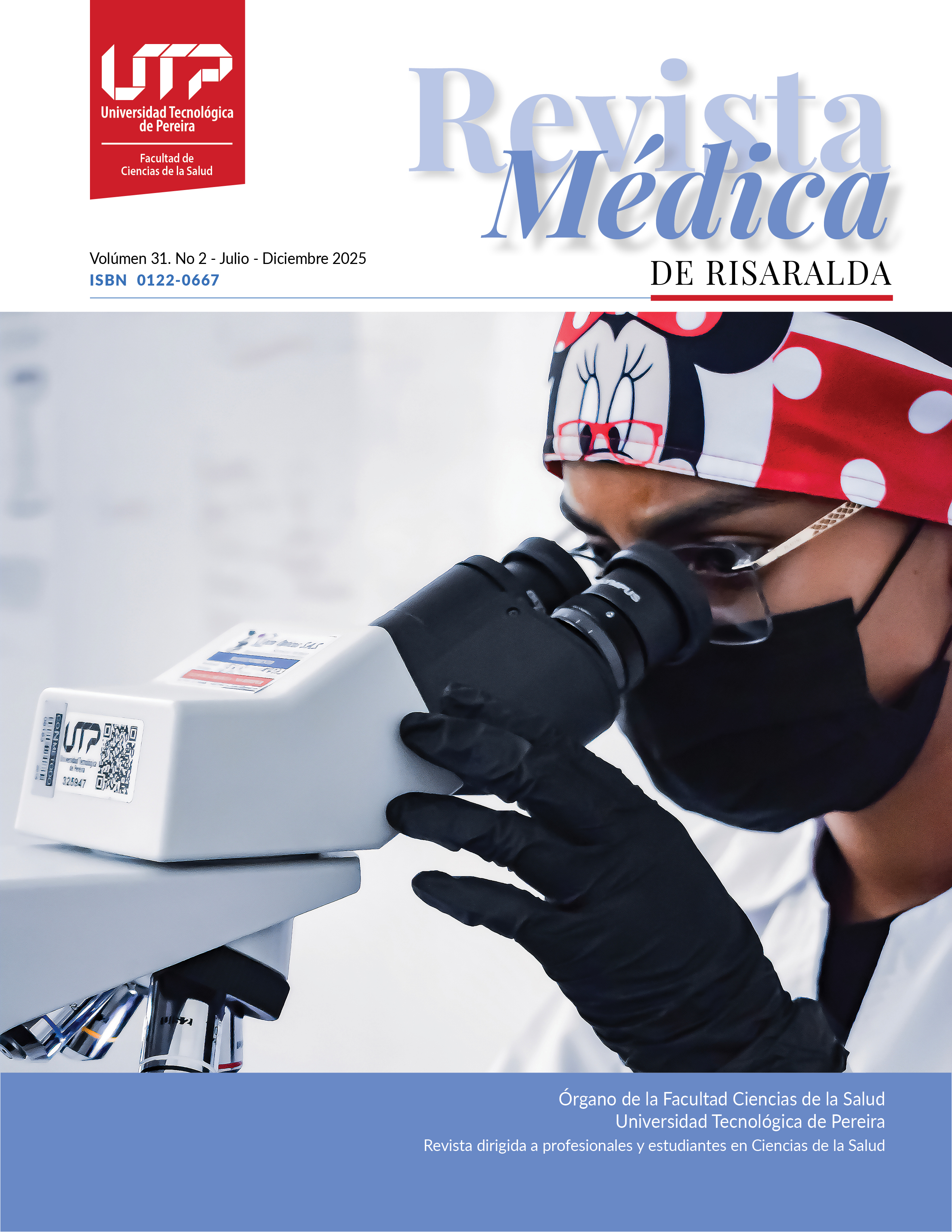Glucose Transporter Type 1 (GLUT1) Deficiency Syndrome: A Case Report
DOI:
https://doi.org/10.22517/25395203.25778Keywords:
GLUT1, Glut1 deficiency syndrome, SDGLUT1, Epilepsy, KetogenicAbstract
The human brain represents only 2% of an adult individual's body weight. However, it requires 25% of the energy consumed by the body. This energy, primarily delivered to the brain in the form of the nutrient glucose, must cross the blood-brain barrier (BBB) through glucose transporter 1 (GLUT1), the main cerebral hexose transporter. Therefore, the levels of this transporter could affect brain function.
It is now recognized that Glut1 Deficiency Syndrome is significantly underreported. It follows an autosomal dominant inheritance pattern, with 90% of cases resulting from de novo mutations, while a small percentage are inherited in an autosomal recessive manner.
This report reviews the case of an adult patient with refractory epilepsy and progressive deterioration, whose clinical characteristics and genetic study confirmed the SLC2A1 mutation, establishing the diagnosis and highlighting the importance of considering this condition in differential diagnoses.
Downloads
References
Tang M, Monani U. Glut1 deficiency syndrome: New and emerging insights into a prototypical brain energy failure disorder. Ann Clin Transl Neurol. 2021 Apr 28. https://doi.org/10.1002/acn3.51353
Klepper J, Leiendecker B, Glut1DS Study Group. Glut1 Deficiency Syndrome (Glut1DS): State of the art in 2020 and recommendations of the International Glut1DS Study Group. Epilepsia Open. 2020;5(3):354–65. https://doi.org/10.1002/epi4.12409
De Vivo DC, Trifiletti RR, Jacobson RI, et al. Defective glucose transport across the blood-brain barrier as a cause of persistent hypoglycorrhachia, seizures, and developmental delay. N Engl J Med. 1991;325(10):703–9. https://doi.org/10.1056/NEJM199109053251006
Coman D, Sinclair K, Burke C, Appleton DB, Pelekanos JT, King J, et al. Seizures, ataxia, developmental delay and the general pediatrician: Glucose transporter 1 deficiency syndrome. J Paediatr Child Health. 2006;42(5):263–7. https://doi.org/10.1111/j.1440-1754.2006.00851.x
Furuse T, Yamada K, Takemoto K, et al. A new mouse model of GLUT1 deficiency syndrome exhibits abnormal sleep-wake patterns and alterations of glucose kinetics in the brain. Dis Model Mech. 2019;12(11):dmm038828. https://doi.org/10.1242/dmm.038828
Brockmann K, Wang D, Korenke GC, et al. Autosomal dominant Glut1 deficiency syndrome and familial epilepsy. Ann Neurol. 2001;50(4):476–85. https://doi.org/10.1002/ana.1124
Wolking S, Becker F, Bast T, Wiemer-Kruel A, Mayer T, Lerche H, et al. Focal epilepsy in glucose transporter type 1 (Glut1) defects: Case reports and a review of literature. J Neurol. 2014;261(3):554–60. https://doi.org/10.1007/s00415-013-7231-4
Wang D, Pascual JM, De Vivo DC. Glucose Transporter Type 1 Deficiency Syndrome. In: Adam MP, Ardinger HH, Pagon RA, et al., editors. GeneReviews®. Seattle (WA): University of Washington, Seattle; 2002.
Cornejo E. Síndrome de deficiencia del transportador de glucosa tipo 1 (SDGLUT-1) tratado con dieta cetogénica. Caso clínico. Rev Med Chil. 2007;135(5):631–5. https://doi.org/10.4067/S0034-98872007000500012
Leen WG, Wevers RA, Kamsteeg EJ, et al. Cerebrospinal fluid analysis in the workup of GLUT1 deficiency syndrome: A systematic review. JAMA Neurol. 2013;70(11):1440–4. https://doi.org/10.1001/jamaneurol.2013.3919
Yang H, Wang D, Engelstad K, et al. Glut1 deficiency syndrome and erythrocyte glucose uptake assay. Ann Neurol. 2011;70(6):996–1005. https://doi.org/10.1002/ana.22541
Becker F, Schubert J, Weckhuysen S, et al. Do Glut1 (glucose transporter type 1) defects exist in epilepsy patients responding to a ketogenic diet? Epilepsy Res. 2015;114:47–51. https://doi.org/10.1016/j.eplepsyres.2015.04.001
Van der Louw EJ, Desadien R, Vehmeijer FO, et al. Concomitant lamotrigine use is associated with decreased efficacy of the ketogenic diet in childhood refractory epilepsy. Seizure. 2015;32:75–7. https://doi.org/10.1016/j.seizure.2015.09.001
Kulikova-Schupak R, Ho YY, Kranz-Eble P, et al. Stimulation of GLUT1 gene transcription by thioctic acid and its potential therapeutic value in Glut1 deficiency syndrome (GLUT1-DS). J Inherit Metab Dis. 2001;24(Suppl 1):S106.
Tang M, Park SH, De Vivo DC, Monani UR. Therapeutic strategies for glucose transporter 1 deficiency syndrome. Ann Clin Transl Neurol. 2019;6(9):1923–32. https://doi.org/10.1002/acn3.50851
Downloads
-
Vistas(Views): 230
- PDF (Español (España)) Descargas(Downloads): 94
- PDF Descargas(Downloads): 58
Published
How to Cite
Issue
Section
License
Cesión de derechos y tratamiento de datos
La aceptación de un artículo para su publicación en la Revista Médica de Risaralda implica la cesión de los derechos de impresión y reproducción, por cualquier forma y medio, del autor a favor de Facultad de Ciencias de la Salud de la Universidad Tecnológica de Pereira. 1995-2018. Todos los derechos reservados ®
por parte de los autores para obtener el permiso de reproducción de sus contribuciones. La reproducción total o parcial de los trabajos aparecidos en la Revista Médica de Risaralda, debe hacerse citando la procedencia, en caso contrario, se viola los derechos reservados.
Asimismo, se entiende que los conceptos y opiniones expresados en cada trabajo son de la exclusiva responsabilidad del autor, sin responsabilizarse ni solidarizarse, necesariamente, ni la redacción, ni la editorial.
Es responsabilidad de los autores poder proporcionar a los lectores interesados copias de los datos en bruto, manuales de procedimiento, puntuaciones y, en general, material experimental relevante.
Asimismo, la Dirección de la revista garantiza el adecuado tratamiento de los datos de carácter personal



